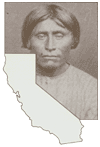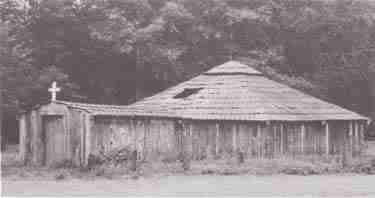|
|
Native Americans

pre-1769
1769-1848
1849-1879
1880-1904
1905-1933
1934-1964
1965-1980
Historic Sites
Selected References
A History of American Indians in California:
PRE-1769
Most historians agree that Portuguese-born Juan Rodriquez Cabrillo was the first European to explore California. Sailing under the Spanish flag in 1542, Cabrillo hoped to find the northwest passage; instead, he found the California coast and claimed the new-found land for Spain. With his entrance into California, the course of California Indian history changed drastically.
"Traditionally, California Indians have been portrayed in history as a docile primitive people, who openly embraced the invading Spaniards and were rapidly subdued. This simplistic contention adds little to a realistic understanding of native history in California and undoubtedly is derived from crude feelings of racial superiority on the part of its advocates." (Heizer, 1978:99) The relationship between the Spanish and the Indians was not a peaceful co-existence. Rather, the history of California Indians is the story of an attempt to survive a series of invasions and the hardships that ensued.
In 1579, an Englishman, Sir Francis Drake, sailed into California. While much discussion has occurred as to exactly where Drake anchored, it is known that he spent five weeks among the California natives. Before leaving, he claimed the whole territory for the English Crown. He based his claim on the "right of discovery." Thus, within the first 40 years of European influence in California, two countries had claimed the land, and neither had acknowledged the rights of the natives who had resided on it for thousands of years.
Other explorers of early California included Pedro de Unamuno in 1587, Sebastian Rodriquez Cermeno in 1595, and Sebastian Vizcaino in 1602-1603. While none of these early explorers stayed very long or developed any framework for the establishment of permanent settlements, their visits had a lasting effect.
The theoretical question of land ownership brought about by Spanish and English claims to California and by non-acknowledgment of the rights of the Indians was overshadowed in practical reality by the introduction of disease. It cannot be determined at this time exactly what effects early explorers and the introduction of their diseases had on California Indians during the early exploration periods, It is certain, however, is that European diseases eventually devastated the Indian population.

Manchester Round House, Mendocino County
NEXT> 1769-1848 |
|
|
|
|
 Native American Nations
Native American Nations
